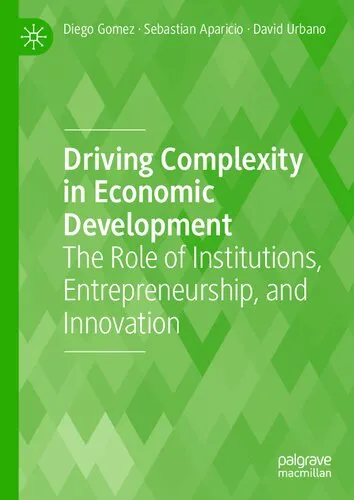Driving Complexity in Economic Development: The Role of Institutions, Entrepreneurship, and Innovation
4.0
Reviews from our users

You Can Ask your questions from this book's AI after Login
Each download or ask from book AI costs 2 points. To earn more free points, please visit the Points Guide Page and complete some valuable actions.Related Refrences:
Introduction to "Driving Complexity in Economic Development: The Role of Institutions, Entrepreneurship, and Innovation"
Economic development is a multifaceted phenomenon shaped by a delicate interplay of factors like institutions, entrepreneurship, and innovation. In "Driving Complexity in Economic Development: The Role of Institutions, Entrepreneurship, and Innovation," we delve deep into the intricate mechanisms that underpin economic growth and societal progress. By examining the role of entrepreneurial dynamics, institutional evolution, and technological advancements in fostering development, this book provides a robust framework for understanding the complexity of modern economies.
This volume reaches beyond simplistic development paradigms, presenting a holistic approach to driving meaningful change in emerging and advanced economies alike. Combining theoretical insights with practical examples, the book is a valuable resource for policymakers, entrepreneurs, academics, and anyone eager to understand the forces shaping sustainable economic development. It illustrates how interconnected systems of institutions, innovation, and entrepreneurship operate as key drivers in building resilient economies and inclusive societies.
A Detailed Summary of the Book
The book is divided into several key sections, each addressing core elements integral to navigating the complexity of economic growth. It begins with an exploration of institutional frameworks, highlighting the critical role of governance, property rights, and legal systems in laying the foundation for entrepreneurial activity and innovation. Institutions are portrayed as the stabilizing bedrock, fostering trust, reducing transaction costs, and enabling entrepreneurial ecosystems to thrive.
The second section delves into entrepreneurship as a catalyst for change. Entrepreneurs, viewed as agents of economic dynamism, leverage institutional support to introduce innovations, disrupt markets, and create new industries. This segment examines various entrepreneurial archetypes, such as necessity-based and opportunity-driven entrepreneurs, emphasizing their unique contributions to economic development.
The third part of the book explores the transformative power of innovation. By integrating theoretical frameworks with data-driven analysis, readers are presented with evidence of how technological breakthroughs—ranging from digital communication to green technologies—spur productivity and foster sustainable growth. Innovation is framed as a collective process rooted in creativity, experimentation, and collaboration at multiple levels of society.
Lastly, the book synthesizes these themes to provide actionable recommendations for fostering inclusive and sustainable development. The closing chapters advocate for a systems approach where institutions, entrepreneurship, and innovation co-evolve in an iterative cycle, reinforcing each other over time to generate long-term prosperity and resilience.
Key Takeaways
- Institutions serve as the backbone of economic systems, influencing the paths economies take to evolve and grow.
- Entrepreneurship is not only about creating businesses but also about inspiring structural and systemic change in economies.
- Innovation is a multifaceted process that requires cross-sectoral collaboration and robust policy frameworks to be sustainable.
- Developing economies benefit from adaptive strategies that align institutional reforms with entrepreneurial capabilities and innovative practices.
- Economic development is a complex, iterative process that demands continuous experimentation and learning.
Famous Quotes from the Book
"Economic growth is not a linear process; it is a cascading reaction where institutions, entrepreneurship, and innovation persistently interact."
"The true measure of progress lies not merely in wealth accumulation but in building a society that fosters inclusivity, resilience, and sustainable growth."
"Entrepreneurship is more than a business endeavor; it is a societal force that redefines what's possible and challenges the limits of our imagination."
Why This Book Matters
As the global economic landscape grows increasingly interconnected and complex, understanding the key drivers of development becomes essential. "Driving Complexity in Economic Development" offers an integrated perspective that equips stakeholders with the tools and insights needed to navigate this complexity. The book's interdisciplinary approach reveals how the synergy between institutions, entrepreneurship, and innovation creates a self-reinforcing loop vital for sustained progress.
By targeting both the theoretical underpinnings and practical applications of economic growth models, this volume bridges the gap between academic research and real-world policy-making. The insights shared herein are as relevant to emerging markets grappling with institutional challenges as they are to advanced economies striving to maintain competitive advantages. The book challenges conventional wisdom and encourages readers to think critically about the role they play in fostering economic transformation.
More than a scholarly work, this book is a call to action—a reminder that sustainable development is achievable only when we embrace change, nurture innovation, and empower individuals to drive meaningful impact within their communities and beyond.
Free Direct Download
You Can Download this book after Login
Accessing books through legal platforms and public libraries not only supports the rights of authors and publishers but also contributes to the sustainability of reading culture. Before downloading, please take a moment to consider these options.
Find this book on other platforms:
WorldCat helps you find books in libraries worldwide.
See ratings, reviews, and discussions on Goodreads.
Find and buy rare or used books on AbeBooks.
1288
بازدید4.0
امتیاز0
نظر98%
رضایتReviews:
4.0
Based on 0 users review
Questions & Answers
Ask questions about this book or help others by answering
No questions yet. Be the first to ask!















